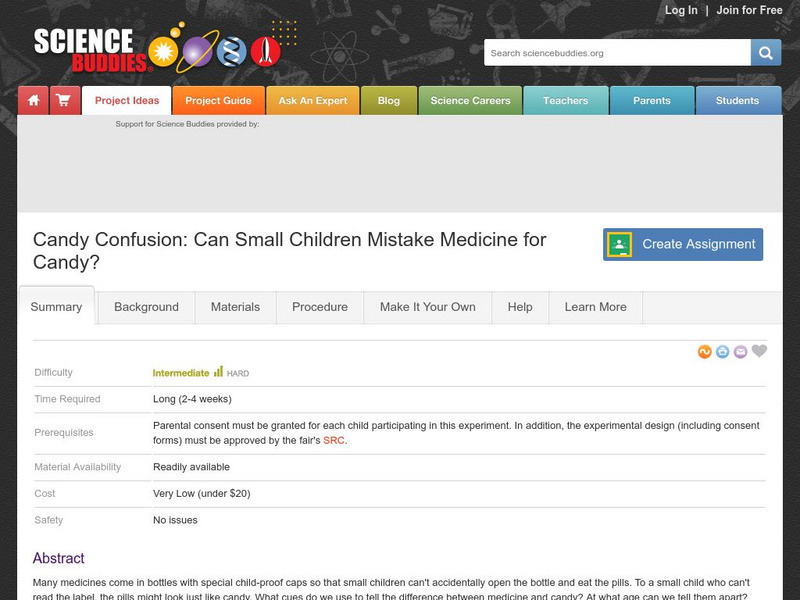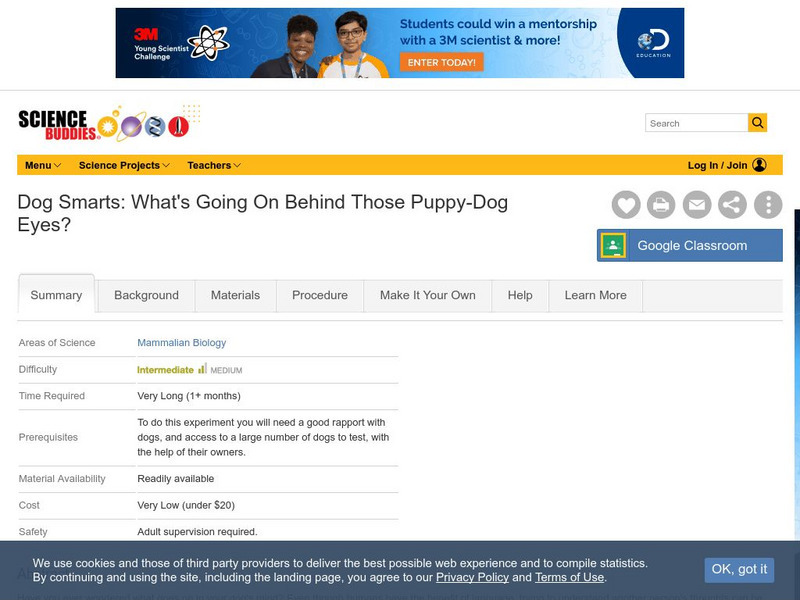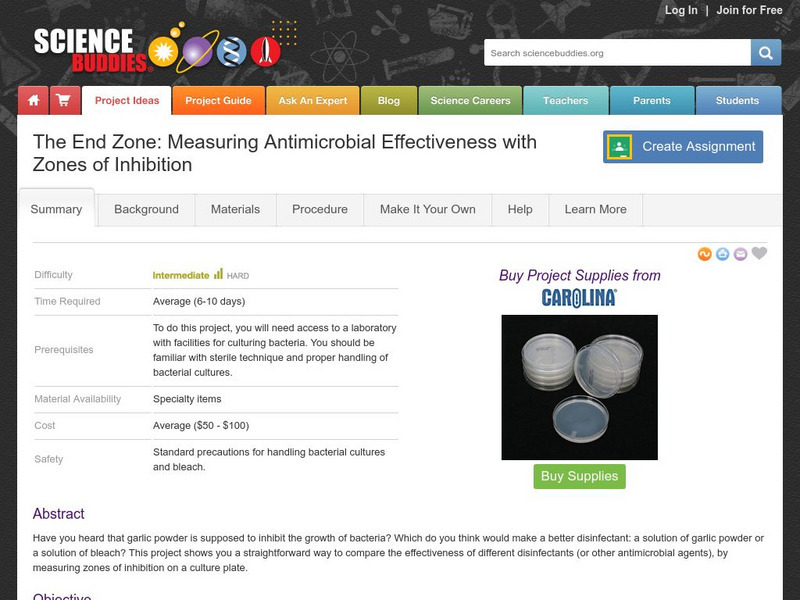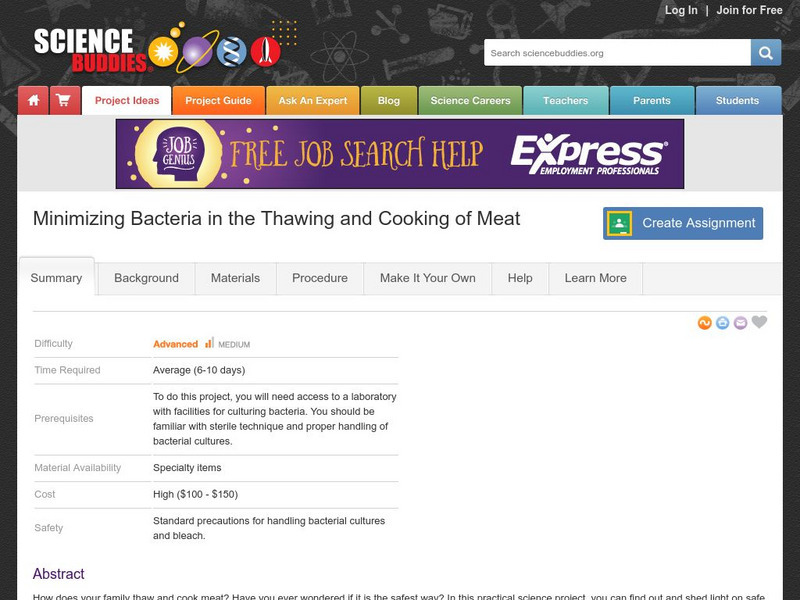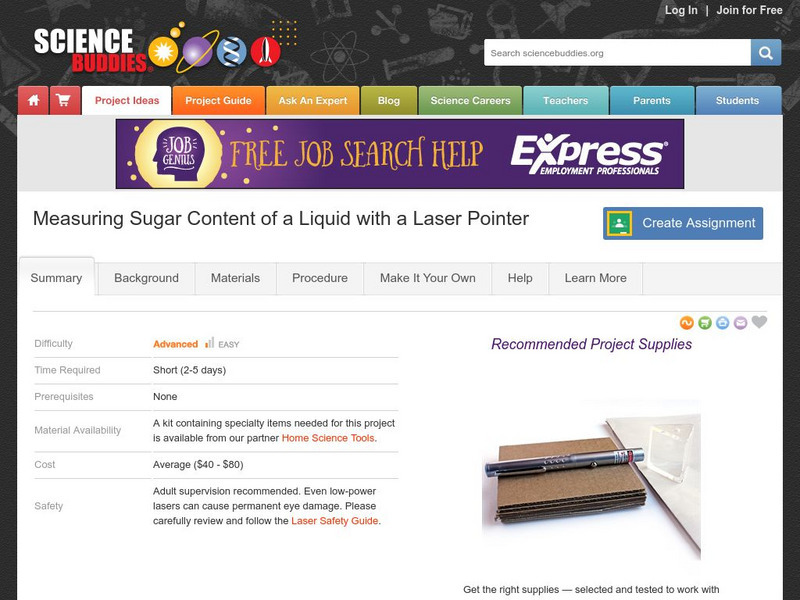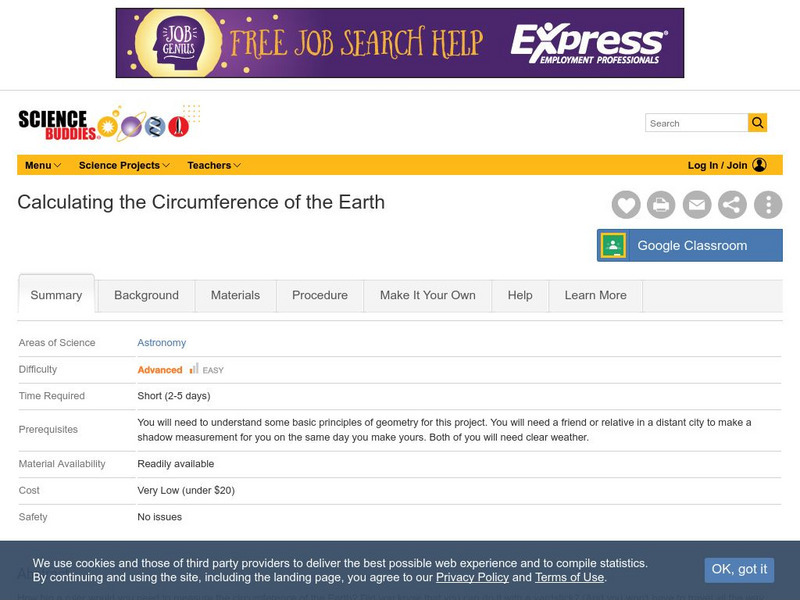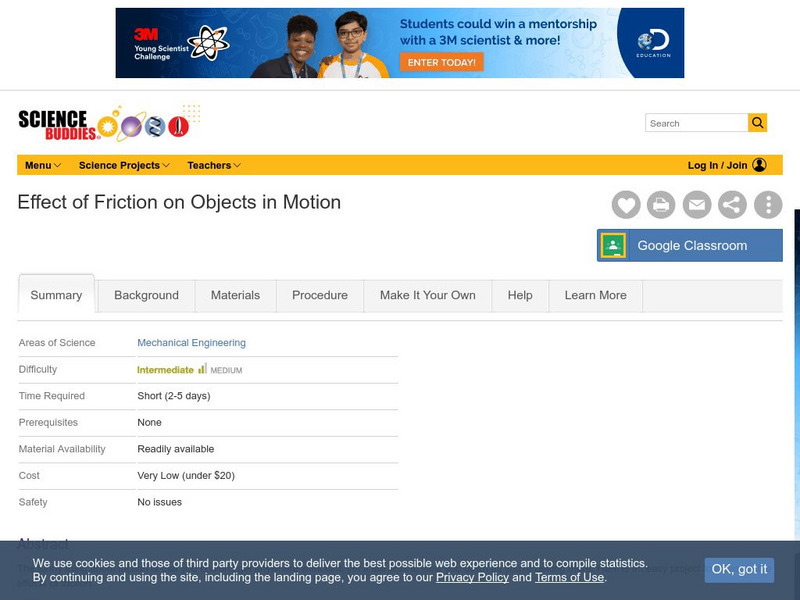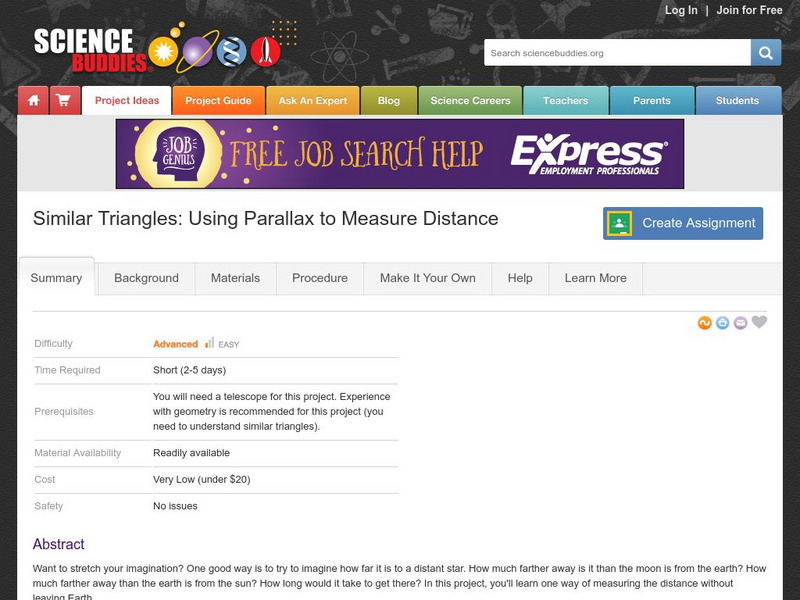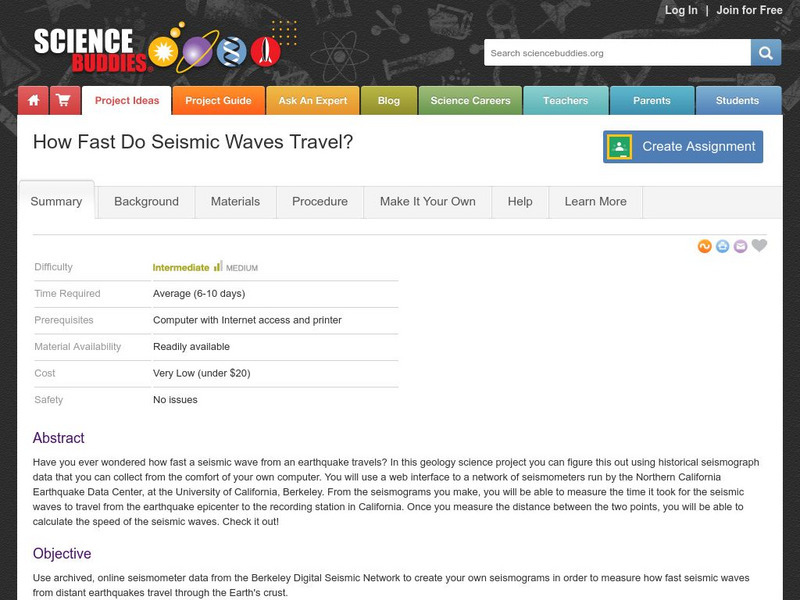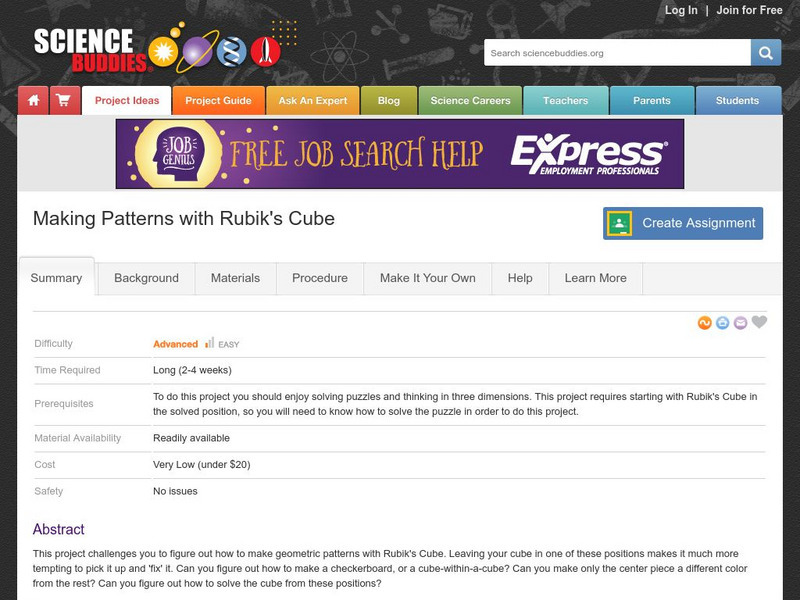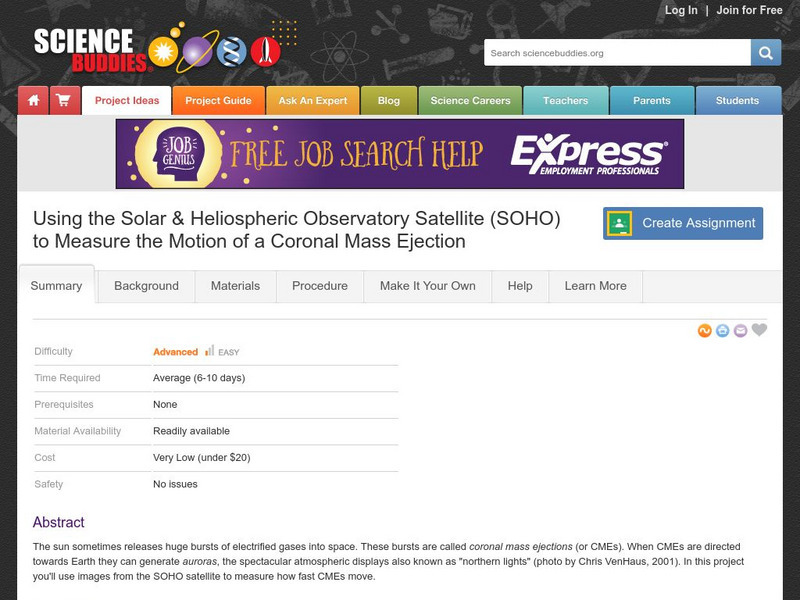Science Buddies
Science Buddies: Candy Confusion: Can Small Children Mistake Medicine for Candy?
Many medicines come in bottles with special child-proof caps so that small children can't accidentally open the bottle and eat the pills. To a small child who can't read the label, the pills might look just like candy. This project helps...
Science Buddies
Science Buddies: Antlion Pits in Open Sand or Under Leaf Cover
Antlion larvae are known for their predatory ways. In sandy areas, they dig pits to trap ants or other crawling insects that happen to stumble in. This project shows you how to create a mini-environment for antlion larvae to test their...
Science Buddies
Science Buddies: Animal Magnetism: Do Magnets Affect Regeneration in Planaria?
The human body has an impressive ability to heal itself after injury, but humans have nothing on planaria. Planaria have an amazing ability to regenerate. An entire animal can regenerate from just a fraction of the body. This project...
Science Buddies
Science Buddies: Explore the Forces of Friction
We all recognize what friction is, but do you really understand what causes it? This project focuses on friction, its causes and forces and specifically how it affects how fast you can slip down slides.
Science Buddies
Science Buddies: Dog Smarts: What's Going on Behind Those Puppy Dog Eyes?
Have you ever wondered what goes on in your dog's mind? Even though humans have the benefit of language, trying to understand another person's thoughts can be hard enough sometimes. This project will show you some behavioral tests you...
Science Buddies
Science Buddies: Eeeeew! Maggot Mass Temperature
If you're looking for an experiment that will gross out just about everyone, you probably can't do much better than this. This project investigates an important question in the field of forensic entomology. Just make sure to get...
Science Buddies
Science Buddies: How Much Weight Can Your Boat Float?
Have you ever wondered how a ship made of steel can float? In this project you'll investigate how much weight boat hulls of various shapes and sizes can support without sinking.
Science Buddies
Science Buddies: Decisions, Decisions: Judging a Book by Its Cover?
This project challenges you to think like a politician (and a scientist.), and try to ascertain what factors are most important as individuals make their decision on how to vote. For example, is it what is being said, or who is saying it?
Science Buddies
Science Buddies: The End Zone: Measuring Antimicrobial Effectiveness
Antimicrobial agents are chemicals that are used against bacteria. There are many such agents available. Because there are many different situations where bacterial control is important, no antimicrobial agent is effective in all...
Science Buddies
Science Buddies: Minimizing Bacteria in the Thawing and Cooking of Meat
Here's a practical project that sheds light on safe practices in the kitchen. Use this information to determine which method of defrosting meat is safest and which method of cooking kills the most bacteria.
Science Buddies
Science Buddies: Effects of Food Preservatives on the Growth of Microorganisms
The problem of protecting food from spoilage has been with us since prehistoric times. The solutions to this problem have changed with advances in technology and knowledge about what causes food to spoil. This project uses liquid...
Science Buddies
Science Buddies: Distance and Constant Acceleration
This project is an experiment in classical physics. You'll be following in Galileo's footsteps, and investigating Newton's laws of motion, using a metronome as your timing device. This resource will help you get a firm understanding of...
Science Buddies
Science Buddies: Measuring Sugar Content of a Liquid With a Laser Pointer
Here's a project that shows you how to use a laser pointer and some knowledge of physics to figure out the concentration of sugar dissolved in a liquid.
Science Buddies
Science Buddies: Calculating the Circumference of the Earth
In this project, you will estimate the circumference of the earth, using a method developed about 2,200 years ago, by Eratosthenes, a Greek mathematician and the librarian of the great library at Alexandria, in Egypt.
Science Buddies
Science Buddies: Effect of Friction on Objects in Motion
The funny thing about friction is that you couldn't get anywhere without it, yet it still acts to slow you down as you're getting there. Here is an easy project to measure the effects of friction.
Science Buddies
Science Buddies: Fractography: The Way Things Break
When something goes wrong, do you like to try to figure out why? Engineers do this all the time. They even have a fancy name for it: failure analysis. Understanding how different materials break is an important part of failure analysis....
Science Buddies
Science Buddies: How Does Ratio of Sand to Cement Affect Strength of Concrete?
Concrete is one of those things that most of us don't think about much, yet we use it every day. We walk on concrete sidewalks, drive on concrete roads, and live and work in buildings with foundations made of concrete. It is a durable...
Science Buddies
Science Buddies: Underground Water Flow and Darcy's Law
This project shows you how to build a simple model system to simulate underground water flow. Underground water flow is important for understanding replenishment of underground aquifers, migration of underground contaminant plumes, and...
Science Buddies
Science Buddies: Similar Triangles: Using Parallax to Measure Distance
Want to stretch your imagination? One good way is to try to imagine how far it is to a distant star. How much farther away is it than the moon is from the earth? In this project, you'll learn one way of measuring the distance without...
Science Buddies
Science Buddies: Measuring Vibrational Frequency With Light
Strike a key on the piano, and you hear the string vibrating. Just about any object vibrates when it's knocked, but how much and how fast? This project helps you find out. You'll build a simple light-sensing circuit for measuring the...
Science Buddies
Science Buddies: How Fast Do Seismic Waves Travel?
Here's a geology project that uses historical seismograph data that you can collect from the comfort of your own computer. You'll use a web interface to a network of seismometers run by the Northern California Earthquake Data Center, at...
Science Buddies
Science Buddies: Making Patterns With Rubik's Cube
This project challenges you to figure out how to make geometric patterns with Rubik's Cube. Leaving your cube in one of these positions makes it much more tempting to pick it up and 'fix' it. See if you can determine how different...
Science Buddies
Science Buddies: Devising an Algorithm for Solving Rubik's Cube
If you're the kind of person who has taken apart your Rubik's cube in order to grease the inside parts so it will move more smoothly, this could be a great project for you. This will show you three sets of move sequences that accomplish...
Science Buddies
Science Buddies: Observatory Satellite Measures Motion of Coronal Mass Ejection
The sun sometimes releases huge bursts of electrified gases into space. These bursts are called coronal mass ejections (or CMEs). When CMEs are directed towards Earth they can generate auroras, the spectacular atmospheric displays also...
Other popular searches
- Science Fair Projects Ideas
- Science Fair Projects Topics
- Motion Science Fair Projects
- Coke Science Fair Projects
- Food Science Fair Projects
- Sports Science Fair Projects
- Cool Science Fair Projects
- Csi Science Fair Projects
- Edible Science Fair Projects
- Casi Science Fair Projects


